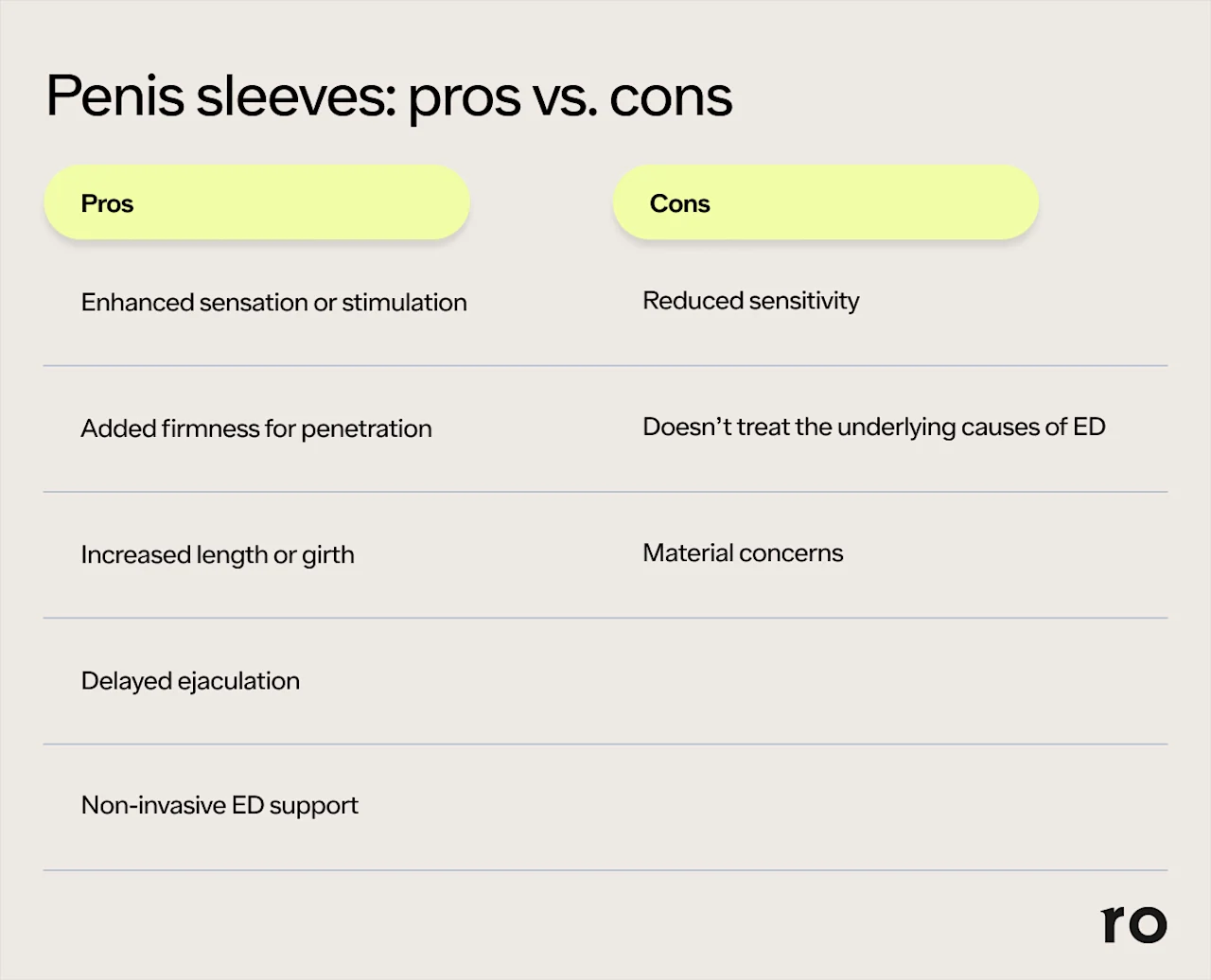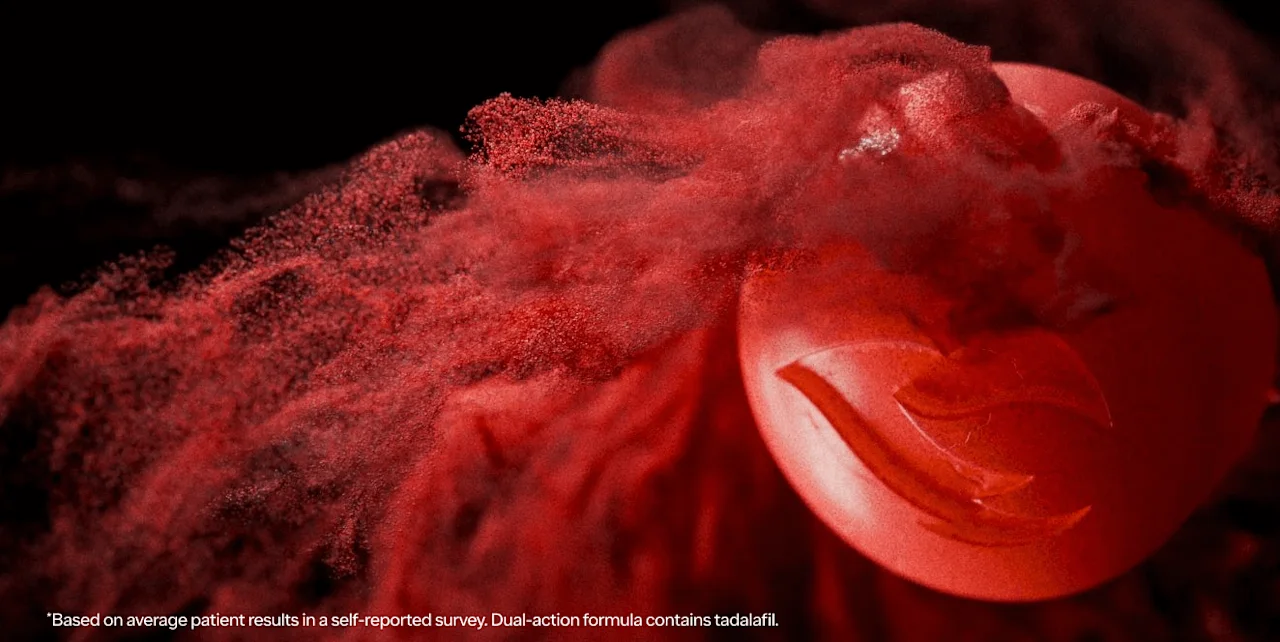Key takeaways
A penis sleeve, or cock sleeve, is a sheath worn over the penis during sex to enhance pleasure and/or help with erectile dysfunction (ED).
Some penis sleeves are designed to add girth or stimulation; others (also known as penile support devices) are medical devices to help people with ED have penetrative sex.
Research on penis sleeves for ED is limited, but anecdotal reports suggest the tool can be an effective enhancement to sexual activity, especially when combined with other ED treatments.
Here's what we'll cover
Here's what we'll cover
Here's what we'll cover
Key takeaways
A penis sleeve, or cock sleeve, is a sheath worn over the penis during sex to enhance pleasure and/or help with erectile dysfunction (ED).
Some penis sleeves are designed to add girth or stimulation; others (also known as penile support devices) are medical devices to help people with ED have penetrative sex.
Research on penis sleeves for ED is limited, but anecdotal reports suggest the tool can be an effective enhancement to sexual activity, especially when combined with other ED treatments.
Whether you're navigating erectile dysfunction (ED), looking to boost pleasure, or just exploring new ways to connect with a partner, sexual wellness tools can offer support in unexpected ways. One product you might come across is a penis sleeve (aka a cock sleeve) — a tool that may sound a little futuristic, but can actually be quite simple to use. So, what is a cock sleeve? And how does it work, if at all?
A penis sleeve is a sheath that goes over the penis to add stimulation, provide structural support, and/or help manage ED symptoms. Simply slipping your member into one of these soft, form-fitting tools can boost bedroom activities for many, with or without ED. But, of course, everyone is different. Curious whether a cock sleeve might be right for you? Below, we break down what you need to know about penis sleeves, including how they work, pros and cons to consider, and how to use them safely.
What is a cock sleeve?
A cock sleeve, or penis sleeve, is a flexible sheath that fits over the penis. Some are used to add length or girth, while others are designed as supportive devices to help people with erectile dysfunction maintain penetration. Penis sleeves can also enhance pleasure for both partners during sex and can be used even if ED is not an issue.
Penis sleeves go by a few different names, depending on the design and intended use. Common monikers include:
Penis sheath
Cock sheath
Penile support sleeve
Penis enhancer
Girth sleeve
Penis sleeves are usually made of soft, flexible, and body-safe materials (like those used in other sex toys), including silicone, latex, rubber, and plastic. The material can affect both comfort and effectiveness for the wearer and the receiving partner, so it's an important consideration when choosing a sleeve. Not all materials are created equal, so be sure to look into the material of any product you purchase before using it.
Penis enhancers and girth sleeves
Some penis sleeves are explicitly marketed as enhancers, i.e. products designed to boost sexual pleasure or create a different (purportedly more enhanced) experience during intercourse.
Penis enhancers and girth sleeves are often made from soft, stretchy materials and focus on:
Adding length or thickness to the penis. These sleeves create the feeling of a larger penis, which, for some users, may boost their confidence or intensify penetration for their partner.
Improving stimulation. Many enhancers feature textured surfaces that are meant to increase sensation for one or both partners.
Delaying ejaculation by reducing direct stimulation to the penis. Thicker material can act as a barrier that reduces sexual sensation, which may help some people last longer during sex. This could be of particular interest to those dealing with premature ejaculation (PE).
Penis sheaths
The term penis sheath is often used interchangeably with “cock sleeve” or "penis sleeve.” These are textured or shaped sleeves that can be used during sex to enhance pleasure, add girth or length, and/or provide structural support for people experiencing erectile dysfunction. Some also include a built-in vibrator to stimulate the wearer or both partners.
Certain types of penis sheaths — also known as penile urinary sheaths — are used medically to manage urinary incontinence or leakage. These devices snugly cover the penis and channel urine into a drainage bag, offering a non-invasive, discreet, and infection-reducing alternative to traditional catheters. While these sheaths are not considered a treatment for benign prostatic hyperplasia or BPH (i.e. an enlarged prostate), they can be used to help address associated symptoms like overflow incontinence or urinary dribbling.
Penile support devices
A specific subset of penis sleeves, known as penile support devices, is designed for people with erectile dysfunction. These devices aren’t sex toys; they’re functional tools intended to support penetrative sex when natural rigidity is lacking.
Unlike softer sleeves used for enhancement or pleasure, penile support devices are firmer and more structured. They typically cradle the penis in a semi-rigid sheath that maintains shape during sex. Some designs include straps or loops that secure the sleeve to the body, ensuring stability throughout intercourse.
The device works by providing external support along the shaft and gently extending the glans (head of the penis) away from the base. This creates enough firmness to allow for penetration, even without a strong erection. For some, these tools can restore a sense of sexual confidence and intimacy without relying solely on pills or more invasive treatments.

Pros of using a penis sleeve
Now that you know what a cock sleeve is, let’s break down how they can contribute to both pleasure and support. Here are some potential penis sleeve perks (say that five times fast!) to consider:
Enhanced sensation or stimulation. Many penis sleeves are designed with textures or vibrators to heighten stimulation during sex.
Added firmness for penetration. Penile support sleeves are often used by people with erectile dysfunction to help maintain enough firmness for penetration. These devices offer structural support, making it possible to have intercourse even without a full erection.
Increased length or girth. Some sleeves are designed to temporarily increase the appearance of penis size, either in length, girth, or both, which may change the experience of sex for one or both partners.
Delayed ejaculation. Thicker sleeves — often marketed as “thickened condoms” — act as a barrier between the penis and direct stimulation. This reduced sensitivity can help some people last longer during sex, making them a useful tool for those dealing with PE.
Non-invasive ED support. Compared to other treatments for erectile dysfunction, like penile injections (e.g. Trimix) or implants, sleeves are non-invasive and easy to use. They don’t require prescriptions or procedures, making them a lower-risk option for many people.
Cons of using a penis sleeve
Despite their possible benefits, penis sleeves may not be the right fit for everyone. Here are a few potential downsides to consider:
Reduced sensitivity. Because sleeves add a layer between the penis and direct contact, they can dull sensation. Though this can be a plus for those experiencing PE, for others, this reduced stimulation may make it more difficult to orgasm or enjoy sex as much.
Doesn’t treat the underlying causes of ED. Penile support sleeves can make penetration possible, but they are not a cure for ED and don’t treat the underlying causes of the condition (e.g. poor blood flow to the penis, diabetes, stress). If you're experiencing ED, it’s important to talk to a healthcare provider about comprehensive treatment options, such as prescription medications (e.g. Viagra, Cialis), lifestyle changes (e.g. regular exercise, a healthy diet, ample sleep), and/or mental health care (e.g. therapy).
Material concerns. Not all sleeves are made from high-quality, body-safe materials, and even those that are may still cause issues for some users. People with latex allergies, for example, may experience symptoms like itching or irritation when using certain products. In extreme cases, this allergy can also cause anaphylaxis, a potentially life-threatening reaction that causes difficulty breathing. If you experience any of these symptoms while using a penis sleeve, stop using the product and seek immediate medical attention.
How does a penis sleeve work for ED?
For people experiencing erectile dysfunction, a penis sleeve functions as an external support structure, a non‑medical, non-invasive option that can help facilitate penetration even in the absence of a full erection.
Some of these sleeves help maintain shape and firmness. They can do this by holding the penis in a semi-rigid or rigid form, which can allow for penetration without relying entirely on natural blood flow.
Others ensure the penis stays safely in place. Many models include straps, loops, or harnesses that help keep the device from slipping during sex. This ensures stability and boosts confidence during intercourse.
These devices can be especially helpful if:
Standard ED treatments (e.g. Rx medications) aren’t effective or produce too many side effects
There are mechanical problems or dissatisfaction with a surgically implanted penile prosthesis
You prefer a non-surgical, non-pharmaceutical treatment option
Some sleeves are also designed with additional sexual needs in mind, such as:
Delayed ejaculation. Thicker sleeves can reduce sensitivity, which may help some users last longer during sex — a common concern for people with PE, yes, but also those with ED. (In fact, research shows that individuals with ED are more likely to report problems with premature ejaculation and sexual stamina, as well.)
Partner stimulation. Textured or vibrating sleeves can enhance sensation for the receiving partner, contributing to a more satisfying experience for both people. (Think of it this way: Seeing your partner enjoy sex can reduce pressure and anxiety, which can be two key psychological barriers in ED.)
Boosted confidence. Feeling like you’re satisfying your partner can boost self‑esteem, creating a positive feedback loop that can support stronger, more consistent erections.
Custom sizing. Sleeves designed to fit your specific anatomy may offer better tactile stimulation. This can amplify sexual arousal and aid erection quality in those with ED.
However, it’s important to remember that a penis sleeve is not a cure for ED itself; rather, it can serve as a functional aid that helps enable penetration when erections are unreliable or not firm enough for penetration.
That said, not having sex can affect your stress levels, self-esteem, and relationships, and penis sleeves can offer a viable bridge to sexual intimacy for many people. If you’re considering one, talk to a healthcare provider to make sure it fits your needs and works alongside any other treatments.
How effective are penis sleeves for ED?
Although high-quality research is still limited, anecdotal reports suggest that penis sleeves can be helpful for some people managing ED. This highlights the need for more studies to better understand the potential benefits and safety considerations of these devices for both the wearer and partner.
The effectiveness of a penis sleeve depends on several factors, including the severity and cause of ED, the specific product used, and how well it fits. It also depends on the context in which it’s used; for instance, whether it’s paired with other treatments like medication or lifestyle changes.
The wearer’s partner can also play a big role in a sleeve’s success. Mutual sexual engagement and joint involvement in ED treatment — such as attending therapy together — can all contribute to long-term success.
Are penis sleeves safe?
When made from body-safe materials and used as directed, penis sleeves are generally considered safe. However, there are a few precautions to keep in mind:
Use sleeves made from soft, pliable medical-grade materials, such as silicone, or other body-safe materials.
Avoid using products that are overly constrictive, as this can injure the penis, especially if worn for extensive periods of time.
Clean the sleeve thoroughly before and after each use to avoid introducing bacteria or irritants; the same goes for the cock sleeve.
Follow the specific product and/or your healthcare provider’s instructions accordingly.
Avoid rubber- or latex-based products if you have an allergy, and stop using the sleeve and seek medical attention if you show signs of an allergic reaction, like itching or irritation.
How much do penis sleeves cost?
The cost of penis sleeves varies based on the brand, material, and features. Simpler, inexpensive options tend to be priced around $20, while more costly, specialized, and custom-made products can cost upward of $500.
In general, less expensive sleeves are often made from thinner, more flexible silicone and may offer limited durability or fewer features. These budget-friendly options can be good for casual experimentation or short-term use, but may not hold up as well over time. Keep in mind, though, that cheaper cock sleeves are less likely to be made of body-safe or medical-grade materials, which are your safest bet.
On the other hand, more expensive sleeves tend to use medical-grade materials, include structural support for ED, and/or offer customized options for a more secure fit. Reusable construction and higher build quality also contribute to their higher price point.
How to choose a penis sleeve
Choosing the right penis sleeve ultimately depends on your needs and preferences. If you’re using the cock sleeve to help treat conditions like ED or PE, you should check with your healthcare provider to get their recommendations for which device might be best for you. Here are a few tips to help you land on the right option:
Check sizing options. Devices that adequately match the size and shape of your penis can support better stimulation. So, grab a tape measure or ruler and measure your penis; then use sizing guides, such as those provided by the product manufacturer, to make sure the sleeve is the right fit over your erect penis.
Look for body-safe materials. Avoid products made of plastic or that contain phthalates (chemicals used to make plastics more durable), which have been linked to potential hormone disruption and other health concerns. If you have a latex allergy, be sure to choose a latex-free product made from materials like medical-grade silicone.
Consider your purpose. Are you using the sleeve for pleasure, ED support, or both? Your goal can guide the type of sleeve you choose.
How to use a penis sleeve
There are many different types of penis sleeves, so how you use one will depend on the specific product. Always follow the instructions that come with your sleeve. That said, here’s a general guide for how to use medical-grade cock sleeves:
Apply lubricant. A water-based lube on both your penis and inside the sleeve can help reduce friction.
Position the base ring (if applicable). If your sleeve includes a loop for the testicles, gently stretch it and guide your testicles through the opening before putting on the shaft.
Slide the sleeve on. Slowly insert your penis into the shaft of the sleeve. Add more lubricant as needed to ensure a smooth, comfortable fit.
Secure any straps. If your sleeve has a harness or drawstrings, adjust it for comfort and stability.
Clean after use. Wash the device with soap and warm water, and let it dry before storing.
Should I buy a penis sleeve?
That depends on your personal goals and needs. Penis sleeves can be an empowering tool for sexual exploration, confidence, and ED management. Before you press “purchase,” think about:
What you want to get out of it. Do you want a penis sleeve to help maintain an erection, to change the length of your penis, or to enhance stimulation for you and your partner — or a combination of these? Considering questions like these can help you decide which — if any — option may be right for you.
Whether your partner is on board. Involving your partner in the decision to use a sleeve can improve the overall experience for both of you.
What the sleeve is made of. Stick to products made of safe materials like medical-grade silicone, and avoid options with plastic and phthalates.
Alternatives to penis sleeves for ED
While penis sleeves can be helpful for some, not everyone is interested in strapping on or slipping their member into a silicone sheath for sexy time. Sound like you? Good news: There are several other options to manage your down-there difficulties. Here are some of the best treatments for ED:
Prescription medications
ED medications approved by the US Food and Drug Administration (FDA), such as Viagra (sildenafil) and Cialis (tadalafil), are part of a drug class known as PDE5 inhibitors. These prescription pills — which also include Stendra (avanafil) and vardenafil — work in part by increasing blood flow to the penis to make it easier to get and maintain an erection. They’re often the first-line treatment for ED thanks to the large swath of studies supporting their safety and efficacy.
Some PDE5 inhibitors also come in different formulations, such as:
Daily Rise Gummies. These fruit-flavored gummies contain tadalafil (the active ingredient in Cialis) and are designed to be taken daily (instead of as-needed) to allow for increased spontaneity.
Ro Sparks. Made with sildenafil and tadalafil (the active ingredients in Viagra and Cialis, respectively), this 2-in-1 sublingual treatment dissolves under the tongue for fast-acting effects.
While these last two options are not FDA-approved, their active ingredients have been individually FDA-approved for ED. They also require a prescription from a licensed healthcare provider.
Devices and other therapies
If oral medication isn’t suitable or effective, several additional therapies may help address your symptoms. All options come with their own risks and benefits. Some of the options include:
Vacuum erection devices. Also known as penis pumps, these gadgets create suction around the penis, drawing blood into the area to induce an erection. A constriction ring can then be placed at the base to help maintain firmness.
Low-intensity shockwave therapy. This non-invasive treatment uses shockwaves to improve circulation in the penis over time. Though it’s not FDA-approved for ED, it can be prescribed off-label for that use.
Penile injections. Medications like papaverine, prostaglandin E1, and alprostadil are injected directly into the base or side of the penis to increase blood flow.
Penile prosthesis. The most invasive of the options, this involves surgically implanting a device inside the penis to allow you to manually produce an erection.
Lifestyle changes
Improving your overall health can also improve erectile function. Consider lifestyle changes such as:
Regularly exercising
Eating a balanced, nutrient-rich diet
Addressing your weight if you are dealing with overweight or obesity
Limiting alcohol
Reducing stress and anxiety
Prioritizing quality sleep
Bottom line
Penis sleeves can be a low-risk way to explore sexual wellness and intimacy, especially if traditional treatments for conditions like ED haven’t worked or aren’t the right fit. That said, they’re not one-size-fits-all. Here are the key points to keep in mind as you decide what’s best for you:
Cock sleeves can add girth, texture, or stimulation, which may improve sensation and satisfaction for you and your partner. This, in turn, can boost your confidence, addressing what can sometimes be a barrier to stronger erections.
A specific type of penis sleeve known as penile support sleeves can help with penetration when natural rigidity is, well, MIA. That said, they don’t address underlying causes like poor blood flow and, thus, do not treat ED.
Choosing the right size and body-safe material (e.g. silicone) can improve comfort, stability, and overall experience with a cock sleeve. Involving your partner in the decision and use can increase the comfort and effectiveness of a cock sleeve.
Though there seems to be lots of variety when it comes to fit, features, and cost, cock sleeves are far from your only option for enhancing your sexual experience, especially if you have ED. Other common treatments include prescription medications (e.g. Viagra, Ro Sparks) and lifestyle changes (e.g. regular exercise, eating a healthy diet, quitting smoking), among others. Consult your healthcare provider to discuss your symptoms and determine how to best address them.
DISCLAIMER
If you have any medical questions or concerns, please talk to your healthcare provider. The articles on Health Guide are underpinned by peer-reviewed research and information drawn from medical societies and governmental agencies. However, they are not a substitute for professional medical advice, diagnosis, or treatment.
Viagra Important Safety Information: Read more about serious warnings and safety info.
Cialis Important Safety Information: Read more about serious warnings and safety info.
References
Chen, Y., Jiang, Y., Li, X., et al. (2025). Penile enhancement: A comprehensive and current perspective. Current Urology, 19(3), 145–156. doi: 10.1097/CU9.0000000000000264. Retrieved from https://pmc.ncbi.nlm.nih.gov/articles/PMC12076428/
Corona, G., Rastrelli, G., Limoncin, E., et al. (2015). Interplay Between Premature Ejaculation and Erectile Dysfunction: A Systematic Review and Meta-Analysis. The Journal of Sexual Medicine, 12(12), 2291–2300. doi: 10.1111/jsm.13041. Retrieved from https://academic.oup.com/jsm/article-abstract/12/12/2291/6966704
Enyoh, C. & Wang, Q. (2024). Sex toys for pleasure, but there are risks: In silico toxicity studies of leached Micro/Nanoplastics and phthalates. Hygiene and Environmental Health Advances, 10. doi: 10.1016/j.heha.2024.100092. Retrieved from https://www.sciencedirect.com/science/article/pii/S2773049224000059
Leslie, S. W. & Sooriyamoorthy, T. (2023). Erectile Dysfunction. StatPearls. Retrieved from https://www.ncbi.nlm.nih.gov/books/NBK562253/
Nguyen, K. & Kohl, Ai. (2023). Latex Allergy. StatPearls. Retrieved from https://www.ncbi.nlm.nih.gov/books/NBK545164/
Tsai, W. K., Chiang, P. K., Lu, C. C., & Jiann, B. P. (2019). The Comorbidity Between Premature Ejaculation and Erectile Dysfunction-A Cross-Sectional Internet Survey. Sexual Medicine, 7(4), 451–458. doi: 10.1016/j.esxm.2019.06.014. Retrieved from https://academic.oup.com/smoa/article/7/4/451/6956445
U.S. Food and Drug Administration (FDA). (2018). External Penile Rigidity Devices - Class II Special Controls Guidance Document for Industry and FDA Staff. Retrieved from https://www.fda.gov/medical-devices/guidance-documents-medical-devices-and-radiation-emitting-products/external-penile-rigidity-devices-class-ii-special-controls-guidance-document-industry-and-fda-staff
Veale, D., Vaidya, A., Papageorgiou, A., et al. (2021). A preliminary investigation of a novel method to manipulate penis length to measure female sexual satisfaction: a single-case experimental design. BJU International, 128(3), 374–385. doi: 10.1111/bju.15416. Retrieved from https://bjui-journals.onlinelibrary.wiley.com/doi/10.1111/bju.15416
Wang, Z. & Yu, J. (2022). Efficacy evaluation of thickened condom in the treatment of premature ejaculation. Translational Andrology and Urology, 11(2), 253–259. doi: 10.21037/tau-22-8. Retrieved from https://www.researchgate.net/publication/358611848_Efficacy_evaluation_of_thickened_condom_in_the_treatment_of_premature_ejaculation
Wassersug, R. & Wibowo, E. (2017). Non-pharmacological and non-surgical strategies to promote sexual recovery for men with erectile dysfunction. Translational Andrology and Urology, 6(Suppl 5), S776–S794. doi: 10.21037/tau.2017.04.09. Retrieved from https://pmc.ncbi.nlm.nih.gov/articles/PMC5715194/
Yates, A. (2024). Penile urinary sheaths: a continence management system for men. British Journal of Community Nursing, 29(Supp 5), S38–S40. doi: 10.12968/bjcn.2024.29.Sup5.S38. Retrieved from https://pubmed.ncbi.nlm.nih.gov/38728167/













